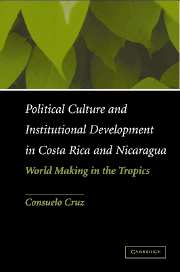 Political Culture and Institutional Development in Costa Rica and Nicaragua
Political Culture and Institutional Development in Costa Rica and Nicaragua Book contents
- Frontmatter
- Contents
- Acknowledgments
- List of Abbreviations
- Chronology
- Political Culture and Institutional Development in Costa Rica and Nicaragua
- Introduction
- 1 Theoretical Overview
- 2 Manichean Identities and Normative Scheming: Origins
- 3 Orphans of Empire: Constructing National Identities
- 4 Postcolonial Paths: Rhetorical Strategies and Frames
- 5 Costa Rica: Possibility Mongers
- 6 Nicaragua: Hybrid Arbitration
- 7 Tropical Histories: Paradise and Hell on Earth
- 8 Transition: Familiar Novelties
- Conclusion
- Index
3 - Orphans of Empire: Constructing National Identities
Published online by Cambridge University Press: 20 August 2009
- Frontmatter
- Contents
- Acknowledgments
- List of Abbreviations
- Chronology
- Political Culture and Institutional Development in Costa Rica and Nicaragua
- Introduction
- 1 Theoretical Overview
- 2 Manichean Identities and Normative Scheming: Origins
- 3 Orphans of Empire: Constructing National Identities
- 4 Postcolonial Paths: Rhetorical Strategies and Frames
- 5 Costa Rica: Possibility Mongers
- 6 Nicaragua: Hybrid Arbitration
- 7 Tropical Histories: Paradise and Hell on Earth
- 8 Transition: Familiar Novelties
- Conclusion
- Index
Summary
As in the ship of fools, we are embarked, without the possibility of an aerial view or any sort of totalization.
–Michel de CerteauHistorical ruptures are most often understood as outward manifestations of underlying conflicts between irreconcilable forces, from antagonistic economic groups to rival technological paradigms, from contending ideologies to clashing identities. Spanish America's break with Spain is no exception. Benedict Anderson, for example, explains it as a result of the sense of “nation-ness” that Spanish American “creole communities” had developed by the dawn of the nineteenth century. Similarly, Michael Doyle argues that Spain's “surrender” of its empire to Napoleon in 1808 was a betrayal of Spanish America and broke the “links of legitimacy” between metropole and periphery.
But the forces underlying the rupture were not so stark, either in the consciousness of protagonists or in the events that flowed from their actions. Then, as now, political actors may not be embarked on a ship of fools, but they are still likely to lack an aerial view of their changing world. Early nineteenth century creoles, to be sure, made one sharp distinction: They distinguished between the Crown and Spaniards. But they remained faithful to the former even as they moved, in most cases hesitatingly, toward independence from the latter. Indeed, contrary to Doyle's claim, the Napoleonic crisis in Spain actually fortified the ties between creoles and the Crown.
- Type
- Chapter
- Information
- Political Culture and Institutional Development in Costa Rica and NicaraguaWorld Making in the Tropics, pp. 69 - 90Publisher: Cambridge University PressPrint publication year: 2005


